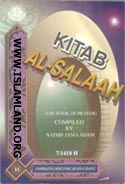Kitab Al-Salaah (The book of Prayer)

Congregational
Prayer
Performance of the prayer together with the other Muslims in
congregation at Mosques is a duty required from every male Muslim of
sound mind. Allah (subhanahu wa ta'ala) says: “ ...And bow down
your heads with those who bow down (in worship)” (Qur'an 2:43).
Much
emphasis has also been made by the Prophet (peace be upon him) about
the Congregational Prayers as can be gathered from the following
authentic sayings:
- “Performing prayer in congregation is 27-times better
than prayer performed on individual basis” (Reported by Imam
Bukhari).
- “Ibn Maktum said: I told the Messenger of Allah that I
am blind and my house is faraway and I have no suitable guide to the
mosque.. do I not have permission to pray at home? The Prophet (peace
be upon him), asked me: 'Do you hear the call to the prayer?' I
answered:
Yes, and the Prophet (peace be upon him) then said to me: 'Respond
accordingly (by coming to the mosque)'” (Reported by Imam
Muslim).
- “If there happens to be (even) three persons in a
village, desert or jungle and they do not pray in congregation, Satan
would surely dominate them. So, observe your prayers in congregation,
for certainly, the wolf devours the lonely sheep” (Reported by
Abu Dawoud).
- “I swear by Allah in Who's possession is my life. I
feel like asking for firewood to be gathered and order for the prayer
to be held and the call for prayer (Adhaan) to be announced and then
ask someone to lead the prayer, and I go after those who failed to join
the congregational prayer and set fire to them while they are in their
houses” (Reported by Imam Bukhari).By
virtue of the above quoted Qur'anic verse as well as the various
sayings of the Prophet (peace be upon him), congregational prayer is
incumbent upon every male Muslim unless a person is excused from doing
so as a result of one or more of the following reasons:
- Sickness.
- Fear that going to the Mosque will bring about undue
hardships, or peril from an enemy.- Heavy rain.
It
is permitted for women to attend the congregational prayers at the
mosques and their husbands may not prevent them from doing so unless it
is feared that harm will come to them. However, it is preferable for
women to perform prayers at their homes. The Prophet (peace be upon
him) says: “Do not prohibit women to attend prayer at mosque, but
prayer at their homes is better for them” (Reported by Imam
Ahmad).
If,
however, women decide to go out for prayer at the mosques, they should
neither dress nor perfume themselves in a manner that may attract the
attention of men. At the mosques, it is an established tradition that
women perform their prayers preferably in their own partition behind
the rows of men.
Purpose of the Congregational Prayer
Performance of the prayer in congregation is a great Islamic practice
through which equality and justice are made manifest. Here, the ruler
and the subject, the old and the young, the rich and the poor, the
powerful and the down-trodden, the influential and the wretched all
assemble in rows shoulder to shoulder in front of Allah, the Almighty,
with neither differences nor distinctions between them - all of them
servants of Allah (subhanahu wa ta'ala). They meet on common ground in
the houses of Allah thinking only of Him in humility in due regard to
the following verse of the Holy Qur'an: “Verily, the most honored
of you in the sight of Allah is (he who is) the most righteous of you”
(Holy Qur'an 49:13).
Islam is a religion of great social order and when a Community of
Muslims in a given area meet at the Congregational Prayers five times
each day, then certainly we can imagine the innumerable benefits that
could be derived - people knowing each other; people learning each
others affairs; people meeting their leaders and community heads;
people discussing and solving their day-to-day problems; people
cooperating etc. Thus, cohesiveness, unity, love and brotherhood become
truly evident among the Muslim community.
In
an Islamic state, the head of the state or his representative is
supposed to lead the five daily congregational prayers at the central
mosque of the capital city as was the practice of the Prophet (peace be
upon him), in the first Islamic state established at Medina. The leader
or head of the Islamic State would, of course, be a person of
unquestionable integrity, known to be more knowledgeable than his
subjects and above all righteous.
Persons wishing to perform a congregational prayer would choose from
amongst themselves an Imam (leader) who has the qualities described
above and who would stand in front of the others at the center of the
row.
After the second call for the prayer (Iqamah) is performed, the Imam
turns towards the congregation and would endeavor to straighten out the
row(s) and urge the congregation to stand close to each other as much
as possible. These acts were established practices of the Prophet
(peace be upon him) as can be noted from the following sayings:
- “Straighten your rows and stand close to each other in
prayer...” (Reported by Imam Bukhari).- “You shall have to straighten your rows in prayer or
else Allah will create differences among you” (Reported by Imam
Bukhari).The
Imam, thereafter, starts the prayer with the words of "Takbiiratil
Al-Ihraam" as usual and the congregation would follow suit. The
congregation would then proceed to complete the prayer as discussed in
detail earlier.
